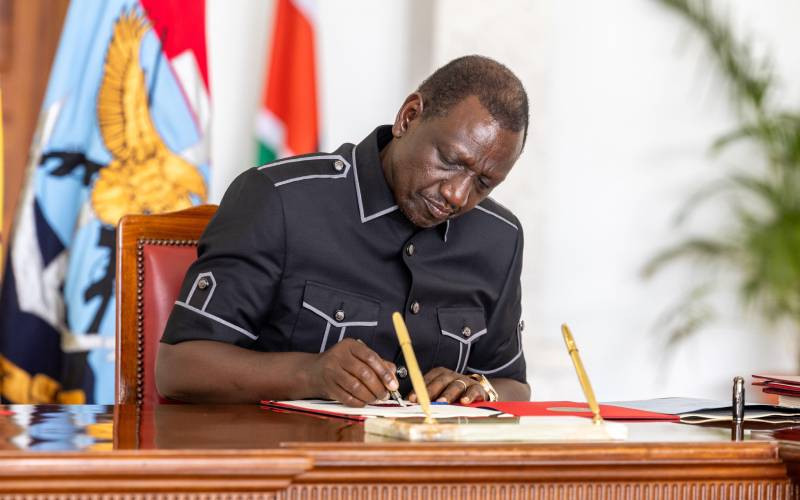 |
|
About 400 soldiers are said to have left the Navy between November 2006 and mid-2008 after securing well-paying jobs in Iraq and Afghanistan. PHOTO: COURTESY |
By WILLIS OKETCH
Mombasa, Kenya: A former Kenya Navy soldier has pleaded guilty to desertion charges at a secretive martial court held at the Kenya Navy Base at Mtongwe in Mombasa.
Last evening Zachary Oichoe was the first ex-serviceman out of 27 detained at the base since mid-February this year to be charged before a mixed tribunal chaired by Mombasa Principal Magistrate Samuel Gacheru. Oichoe, who The Standard reliably learnt was unrepresented, will be sentenced on Thursday.
The prosecution at his court martial was led by Captain SM Kioko who read the charges to the ex-serviceman.
Oichoe pleaded guilty that he deserted the navy without official permission until he returned on February 17. The Standard learnt that only one tribunal out of the three established to try the 27 suspects sat yesterday.
The other 26 suspects did not plead to the charges because an order convening the court martials had not been served on them 24 hours before beginning of trial, as required by the law.
Consequently the trials were suspended until Thursday.
Desertion of the Kenyan Armed Forces attracts a maximum sentence of two years imprisonment without the option of a fine.
Although court martials should be public, the press and public were not allowed into the court. The court martials which were to start early yesterday were delayed until 2pm as parties argued whether to grant the press access. The journalists, who had camped at the base’s gates for hours, were asked to leave amid protests from defence lawyers.
Reports indicate that between 2007 and 2008 no less than 400 navy servicemen from that base resigned to seek jobs with US Security firms in Iraq, Afghanistan and Kuwait.
Defence lawyers claim that the 27 detained at Mtongwe and other bases were lured by their superiors to report to their former stations for official clearance only to be detained.
Most of the 27 soldiers, who first knew of the charges facing them formally on Saturday after more than 42 days in military custody, deny the charges, insisting they left the military lawfully in search of jobs in Iraq, Kuwait and Afghanistan and allege that they were lured to Mtongwe Navy Base with false promises and placed under arrest and forced to sign statements implicating themselves.
Their civilian lawyers warned that the Navy was trying to foster a perception that the former servicemen left the military on the same mission and warned that they will wage a titanic legal battle at the court martial.
They vowed to challenge the validity of the charges and also move to the High Court to test the legality and constitutionality of the Kenya Defence Forces Act of 2012 under which the alleged deserters are to be tried.
And the lawyers also alleged that over 400 servicemen who left the various military formations to work for US security firms in the said countries at the same time as the 27 have now gone into hiding or are seeking legal means to prevent arrest.
Stay informed. Subscribe to our newsletter
Yesterday, lawyer Ben Musundi, who travelled from Nairobi on Sunday to attend the trial of his client, Lieutenant Jeffrey Pepella, left a disappointed man after he found out that his file was not ready.
“I now have to fly back to Nairobi and wait for communication from the Director of Military Prosecutions,” he told The Standard.
Under guard
Pepella, who has been given his uniform and rank back is currently staying at Mtongwe Navy Base, guarded by members of the military police. “My client is a free man but under guard,” Mr Musundi said. “He has not complained of poor treatment or harassment.”
According to sources from the Navy, there was a blank Amnesty for returnees to be discharged from the military.
“It seems like the amnesty ended sometime in February after which they started to arrest the former soldiers,” Musundi said.
Musundi also called for review of the Armed Forces Act. “The military has told us that their act allows detention without trial of up to 42 days,” Musundi said.
“This case calls for the reform of the military,” Musundi, who argued that the Constitution is supreme to the Kenya Defence Act of 2012.
 The Standard Group Plc is a
multi-media organization with investments in media platforms spanning newspaper
print operations, television, radio broadcasting, digital and online services. The
Standard Group is recognized as a leading multi-media house in Kenya with a key
influence in matters of national and international interest.
The Standard Group Plc is a
multi-media organization with investments in media platforms spanning newspaper
print operations, television, radio broadcasting, digital and online services. The
Standard Group is recognized as a leading multi-media house in Kenya with a key
influence in matters of national and international interest.
 The Standard Group Plc is a
multi-media organization with investments in media platforms spanning newspaper
print operations, television, radio broadcasting, digital and online services. The
Standard Group is recognized as a leading multi-media house in Kenya with a key
influence in matters of national and international interest.
The Standard Group Plc is a
multi-media organization with investments in media platforms spanning newspaper
print operations, television, radio broadcasting, digital and online services. The
Standard Group is recognized as a leading multi-media house in Kenya with a key
influence in matters of national and international interest.








